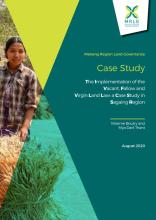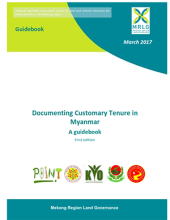Land Library
Welcome to the Land Portal Library. Explore our vast collection of open-access resources (over 74,000) including reports, journal articles, research papers, peer-reviewed publications, legal documents, videos and much more.
/ library resources
Showing items 1 through 9 of 20.This Case Study looks at the implementation of the Vacant, Fallow and Virgin Lands Management Law (VFV Law) in seven villages in Sagaing Region, to assess the practices on the ground and how the law impacts the land tenure security of smallholder farmers.
This guidebook provides conceptual, legal and practical tools and resources to help civil society organizations guide communities through the process of documenting customary tenure at the local level.
In Cambodia, the majority of the population is still composed of smallholder family farmers. 54% of the total labour force is employed in agriculture. They have access to 3.6 million ha of land, representing 19% of the country’s total land.
This country level analysis addresses land governance in Laos in two ways. First, it summarises what the existing body of knowledge tells us about power and configurations that shape access to and exclusion from land, particularly among smallholders, the rural poor, ethnic minorities and women.
Rwanda is developing at a remarkably rapid pace, and with that development has come a multitude of corresponding changes to the orientation and use of land throughout the country.
This Policy Brief summarizes the main findings and recommendations of qualitative and quantative research on implementation and outcomes of the 2007 Expropriation Law in Rwanda.
This case study has been produced in response to a request to the Evidence on Demand Helpdesk. The objective of the request was to provide a detailed case study on the approach taken to land tenure reform by the DFID-funded Land Tenure Regularisation Programme (LTRSP) in Rwanda.
A survey of some 3,500 households in and adjacent to land tenure regularization (LTR) pilot cells was undertaken some 2.5 years after completion of the LTR pilot.
Secure access to productive land is critical to poverty, acknowledging the complexity and
dynamics of evolving rural realities; (b) identify
the major implications of that relationship for
IFAD’s strategy and programme development
and implementation; (c) articulate guiding









